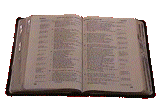

Psalm 19
PSALM 19
Dr. Constable's Notes on Psalms
2. Revelation from Scripture 19:7-11
3. Prayer for cleansing 19:12-14
God has revealed Himself in nature and in Scripture. This revelation should move us to bow in humble adoration and willing obedience before our Creator.222 Psalms 1, 19, and 119 all deal significantly with the Word of God.
David observed in this wisdom hymn that under the influence of the sun, the heavens make God's handiwork in creation known to humanity. Likewise, people learn of God's plan to bless humankind under the influence of God's Law. In view of this dual revelation, in nature and in Scripture, David prayed that God would cleanse his life so he would be acceptable to God. Psalms dealing with the Creation and those dealing with the Torah are both subgroups of the wisdom psalms.
1. Revelation from nature 19:1-6
2. Revelation from Scripture 19:7-11
3. Prayer for cleansing 19:12-14
God has revealed Himself in nature and in Scripture. This revelation should move us to bow in humble adoration and willing obedience before our Creator.222 Psalms 1, 19, and 119 all deal significantly with the Word of God.
God's Two Books
Psalm 19
An EasyEnglish
Translation with Notes
(about 1200 word vocabulary) on Psalm 19
The story of Psalm 19
Moab
"Moab mountain range viewed from Jordan Valley"
We do not know when David wrote Psalm 19. Perhaps it was one morning when he had been out all night with his sheep. He saw the sunrise over Moab. What David saw spoke to him about God. David remembered the stars that he saw at night. God made the stars. In the morning David saw the sun. God made the sun. All that David saw told him about God. He heard no words, there was no language. But David knew that everything was telling him about God.
Then David remembered something else. He remembered the word of God. We call it the Bible. That told him about God as well. David did not have the whole Bible. He only had the start of the Old Testament. But it told him about God. And it made David very happy. But it also made David think. It made him say to himself, "Am I a good or bad man?" He prayed that God would forgive him. David was, perhaps, sitting on the top of a great rock. That spoke to him about God as well! God was like a rock to David. So David called God "My Rock". He also called God his Redeemer. A Redeemer is someone that pays the price to make a slave free.
What Psalm 19 means
Psalm 19 is about words. In verses 1 - 6 nobody speaks the words. We see the moon and the stars and the sun. We see the earth and the animals and the plants. They all make us feel inside ourselves, "Somebody made all this". The psalm tells us in verses 1 and 4 who that is. His name is God. We have a special name for all these things that God made. We call them all "nature". Nature is like a very big book. It tells us, "God made everything".
Now look at verses 7 - 11. Can you find the name "God" in it? No, because here God has a different name. Here he is the LORD. This is the name that people use when they decide to follow God. He becomes their LORD. This part of the psalm is not about the book of nature. This is about the book that we call the Bible. Psalm 19 is a very small part of the Bible. You are reading Psalm 19 in a small book. It has only 112 pages. Bigger books have a lot of pages. David did not have books like ours. He had scrolls. These were long piece of paper. Scrolls were several metres long. God did not write the nature scroll down. It is just a picture to give us help.
So, here are 2 important books about God. In the book of nature we learn how great God is. We learn that he is wonderful. We may feel afraid of him. Christians call this "awe". It makes us want to tell God that he is wonderful. We call this "worship". The other book is the Bible. It tells us how to follow God, and make him our LORD.
Verses 12 - 14 tells us how to start following God. Look on after Psalm 1 if you want help.
Something to do
Learn to say Psalm 19:14 by heart.
Learn to say Psalm 19:14 by heart.
Matthew Henry :: Commentary on Psalms 19
Psalm 19
There are two excellent books which the
great God has published for the instruction and edification of the children of
men; this psalm treats of them both, and recommends them both to our diligent
study.
I. The book of the creatures, in which
we may easily read the power and godhead of the Creator (v. 1-6).
II. The book of the scriptures, which makes known to us the will of God
concerning our duty. He
shows the excellency and usefulness of that book (v. 7-11) and then
teaches us how to improve it (v. 12-14).
To the chief musician. A psalm of
David.
I. What that is which the creatures notify to us. (v 1)
II. What are some of those things which
notify this? (...) (v 2)
III. To whom this declaration is made
of the glory of God. It is made to all parts of the world (v. 3, 4)
In singing these verses we must give God the glory of all the comfort
and benefit we have by the lights of the heaven, still looking above and beyond
them to the Sun of righteousness.
I. The psalmist gives an account of the excellent properties and uses of
the word of God, in six sentences (v. 7-9), in each of which the name Jehovah is
repeated, and no vain repetition, for the law has its authority and all its
excellency from the law-maker.
II. He expresses the great value he had for the word of God, and the
great advantage he had, and hoped to have, from it, v. 10, 11.
III. He draws some good inferences from this pious meditation upon the
excellency of the word of God. Such
thoughts as these should excite in us devout affections, and they are to good
purpose.
In singing this we should get our hearts much affected with the
excellency of the word of God and delivered into it, we should be much affected
with the evil of sin, the danger we are in of it and the danger we are in by
it, and we should fetch in help from heaven against it.
Psalm 19 New American Bible (Revised Edition) (NABRE)
God’s Glory in
the Heavens and in the Law
Footnotes:
a. Psalm 19 The
heavenly elements of the world, now beautifully arranged, bespeak the power and
wisdom of their creator (Ps 19:2–7). The creator’s wisdom is available to human beings
in the law (Ps 19:8–11), toward which the psalmist prays to be open (Ps 19:12–14). The themes of light and speech unify the poem.
b. 19:4 No speech, no words:
the regular functioning of the heavens and the alternation of day and night
inform human beings without words of the creator’s power and wisdom.
c. 19:5 The sun: in other
religious literature the sun is a judge and lawgiver since it sees all in its
daily course; Ps 19:5b–7 form a transition to the law in Ps 19:8–11. The six synonyms for God’s revelation (Ps 19:8–11) are applied to the sun in comparable literature.

PSALM 19: God's Creation and God's Word - (Part 1 of 2)

http://mensagensbiblicas-biblicalmessages.blogspot.com.br/2017/01/psalm-19-gods-creation-and-gods-word.html

http://mensagensbiblicas-biblicalmessages.blogspot.com.br/2017/01/psalm-19-gods-creation-and-gods-word.html

PSALM 19: God's Creation and God's Word - (Part 2 of 2)
The Spacious Firmament on High

The Spacious Firmament on High
Bible Dictionaries
ISBE Main Index:
The ISBE is part of SwordSearcher Bible Software.
.

My Pages
















Nenhum comentário:
Postar um comentário